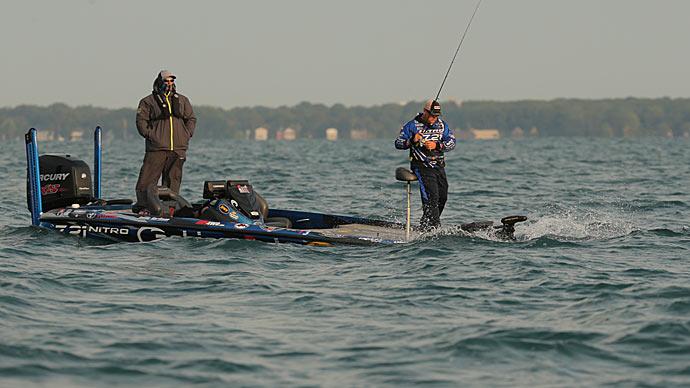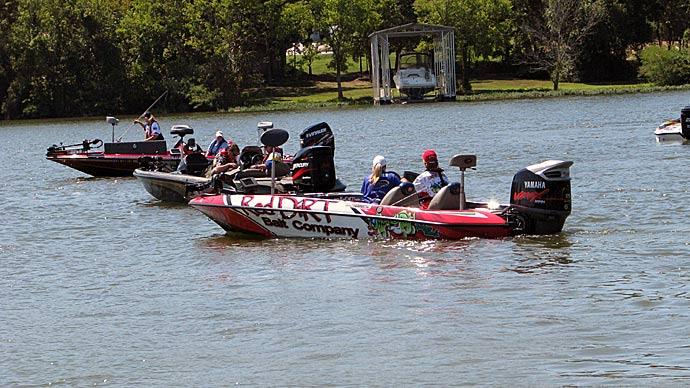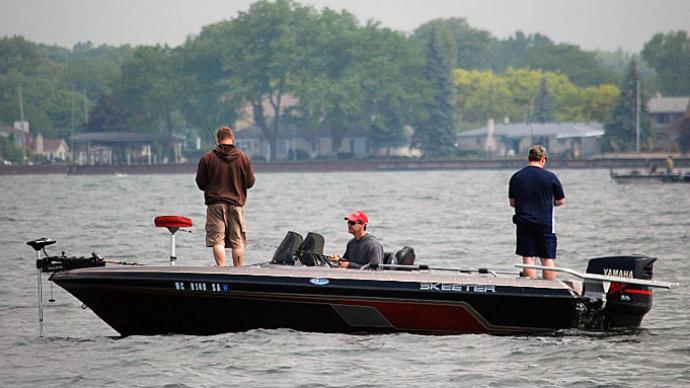PINTLALA, AL. - It turned out to be the perfect lobbying tool - or a unique Christmas gift - any legislator or watercraft user has yet to find under the Yule tree.
No matter what you call it, the "gift" has resulted in safer boating for the public on Alabama's state waters and, no doubt will serve as a model for other states.
Credit Alabama Conservation Commissioner Charles Grimsley for changing the course of boating safety legislation. With funds from his pocket, Grimsley produced a video presented to Alabama lawmakers.
The tape, entitled "Dead In The Water," vividly illustrated the tragic number of lives being lost on state waterways because of increasing accidents, boating crashes, and drownings.
Charley Grimsley had just been appointed as Conservation Commissioner when a series of accidents claimed the lives of three small children in the Roberson and Archer families. So moved by the families' accounts of the careless operation of boats and the increasing dangers on Alabama's waterways, Grimsley, at his own expense, produced the "Dead In The Water" documentary. The tape was sent to the state's 140 legislators as a Christmas message, encouraging the lawmakers to act to end the carnage. The so-named Roberson-Archer Act was passed quickly in 1994 with overwhelming support and only a single "nay" vote.
"Although I helped with the production," B.A.S.S. Founder Ray Scott said, "I cried like a baby when I viewed the entire video. The tape illustrates the tragedies in our waters which will only get worse with more and more boaters and more powerful watercraft. It shows one more time - speed can kill."
"The Alabama Boating, Safety Reform Act is the most comprehensive boating legislation to be enacted in the last 40 years in the United States," says William (Bill) Garner, director of the Alabama Marine Police Division. The Roberson - Archer Act, which requires a boat operator's license in Alabama, "has dramatically reduced the number of on-the-water fatalities by almost 50 percent," according to Garner, a 38-year veteran of boating law administration in Alabama.
"The average number of annual deaths in boating-related fatalities was 30 lost lives," Garner points out. "So far, during 1999 - the first year requiring state boat operator's licensing - the figure stands at 17 deaths. The Alabama boating license policy is working to save lives."
After a five-year phase-in period, the law mandates boat operators must have a "vessel" class listed on their state vehicle driver's license. A boating safety course and passing a test are required. (A particular permit system is used for minimum-age boater operators, 12 - 15 years.)
Latest figures show over 305,000 licensed boaters in Alabama, so there is a growing number of better-informed and educated watercraft users on state waters.
According to Bill Garner, the leading cause of water-related deaths continues to be "capsizing or falls overboard." He adds, "Having a license in your pocket won't change that fact, but boating safety awareness has changed the attitude of boaters and is proving to reduce the numbers of accidents involving collisions.
"Previously, records indicated that collision, speed, and reckless boat operation were the categories showing the largest percentage increase in accidents. The operator's license has directly reduced the incidents," reports Garner. Nonetheless, he predicts that speed and overcrowding will continue to be lethal.
Garner, 66, has witnessed the slow evolution of boating safety measures. He recalls the 1958 federal law sponsored by North Carolina Senator Bonner, which first required safety equipment on board, including fire extinguishers, running lights, and Coast Guard-approved safety vests.
But, almost 20 more years passed before ignition "kill switches" - safety cut-off systems on outboard motors - were required to be installed by boat manufacturers in the United States. As Bill Garner notes, the Alabama boating administration was among the vanguard in pushing the requirement.
"Some early-day kill-switch systems - with a turn-off on the ignition key - were faulty. Then, Mercury Motors came up with the lanyard toggle switch as a cut-off mechanism, and the standard for safety was improved."
Recently Bill Garner has worked to take the requirement for life-saving personal flotation devices (PFD) to the next level.
"Since 1968, the Bass Anglers Sportsman Society (B.A.S.S.) has set the safety example in requiring tournament anglers to wear a Coast Guard-approved life vest when the outboard motor is in operation. As a result, more fishermen wear their life jackets when cranking the outboard engine. But, that's not the full story," says Garner. "The U. S. Coast Guard has approved a new inflatable life vest that is wearable and comfortable in hot weather - a lifesaver fishermen can comfortably wear without interfering with fishing-boating activities," explains Garner.
The inflatable vests are being used exclusively by the Alabama Marine Police Division. The lifesavers worn by the Alabama waterway patrol are the type of CO_ inflatable with a ripcord-pull mechanism.
Most recently, the U.S. Coast Guard approved the automatic-inflatable unit. With the auto-inflate unit, a boater or angler accidentally falling overboard has a "safety net." The auto-inflate unit is inflated in less than three seconds upon entering the water.
These dual safety measures may save many more lives and prevent needless boating accidents. The Alabama Boating Reform Act has - during 1999 alone - resulted in a 20 percent decrease in accidents, 40 percent fewer injuries, and the most important category: almost a 50 percent reduction in deaths.
As a New Year resolution, Bill Garner reminds us of the need for safety and sanity on all our waterways. Here's a simple checklist to remember:
- First and foremost, wear your life vest.
- Always hook up the kill switch. If you're not driving, ensure it's "hooked up."
- Know the rules of the waterways.
- Turn on the boat's running lights.
- Set an example for safety on the water.
- Report any unsafe, reckless boat handling to the waterway patrol.
- Don't "drink and drive."
- Operate your boat as if holding a "loaded gun." Be careful. Be courteous.
- Double-check for safety equipment on board, i.e., fire extinguisher, throw cushion, and air horn.
- And, by all means, be aware: speed thrills, but it also kills.




